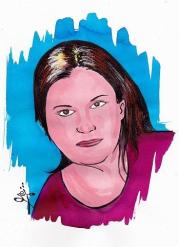Another issue raised by President Barack Obama during his July 11 speech at Accra is the ‘relative’ notion of democracy. In contrast with the previous administration’s call for a U.S.-backing for the ‘spread of democracy,’ Obama underlined that “America will not seek to impose any system of government on any other nation. The essential truth of democracy is that each nation determines its own destiny.”
In fact, the difference between the previous and the current U.S. approach is not about the ‘role,’ as no one in Washington’s government has had any project to ‘impose’ democracy, or specific institutions. The George W. Bush approach tried to say that all nations yearn for democracy and freedom with the same intensity, if given the opportunity.
The Obama approach says the same about the ultimate quest but recommends steering away from fermenting, inciting, or pushing for it. He said: “Each nation gives life to democracy in its own way, and in line with its own traditions.”
This last word, ‘traditions,’ is the narrow window used by the anti-democracy forces, including authoritarian regimes and Islamist movements to keep the free world at bay. If America should not impose ‘its own’ democratic system, can it stay neutral when oppressive regimes and forces impose their ‘own repressive’ systems?
Apparently not since the U.S. and other democracies have stood firmly against the Apartheid regime in South Africa, the Mugabe regime in Zimbabwe, and Madagascar’s coups. But the U.S. remains silent towards Kadhafi’s suppression and hesitates to back democratic forces in many spots of the continent. Obama offered an abstract description of obvious realities: “History offers a clear verdict: governments that respect the will of their own people, that govern by consent and not coercion, are more prosperous, they are more stable and more successful than governments that do not.”
The question is how to identify the ‘will’ of these people if you don’t provide them with the tools of expression, including your own declaration of support? But if you do offer that needed extra push, it would be labeled ‘meddling’ in other countries’ domestic affairs.
As U.S. policy towards Africa seems to avoid clearly recognizing the strategic threats and the ideological root of terrorism, hesitating to strike back at the perpetrators of genocide, shying away from supporting democracy movements, and acting as if slavery was eradicated, one would think that at least on the ground of basic human rights, Washington would catch up with all the above shortcomings. Not so. In Accra, the president said: “In Moscow, I spoke of the need for an international system where the universal rights of human beings are respected, and violations of those rights are opposed. And that must include a commitment to support those who resolve conflicts peacefully, to sanction and stop those who don##t, and to help those who have suffered.”
Le’s check it out. Women’s rights are universal yet the treatment of women in many African countries member of the OIC including Sudan, Somalia, and among the blacks of Mauritania is seen as part of ‘local traditions’ and will be given time to ‘evolve.’ Ethnic and religious minorities are protected by the Universal Declaration yet mass scale breaches in African states affiliated with the Arab League or the OIC are not addressed for fear of ‘meddling.’
The Muslim Berbers of Algeria’s Kabyles, the Christian Copts of Egypt, the Nilotic tribes of southern Sudan, are located within the sphere of the ‘we can’t talk about it.’ On one continent, human rights abuses are denounced only if the victims are outside the house of the big boys, shielded by the oil cartel of the greater Middle East.
Strategic clarity in this new era of globalization is unavoidable. And clarity has to be bold when addressing serious and future shaping matters. Obama gladly clarified what AFRICOM is for: “Our Africa Command is focused not on establishing a foothold in the continent, but on confronting these common challenges to advance the security of America, Africa, and the world.”
Fair enough, in response to the jihadist propaganda disseminated by the petrodollars-funded networks, Africans must learn from the president of the United States that the American people have consented to offer economic and military aid to their continent against the gigantic power of the oil cartel and its regimes and ideologies.
To counter the effects of millions of dollars spent in the Sahel and the Horn to spread ‘extremism’ and intolerance, the arch modern armament acquired by authoritarian regimes committing ethnic cleansing such as Sudan’s and Libya’s, and the grand designs of the Iranian Navy and the Somali pirates in the Red Sea and east Africa, it is all logical that the international community and the United States stand by the weakest to defend its liberties.
The Accra speech, as previous deliveries overseas, is powerful in its oral style but it would have been much more historic had it unleashed more daring truths and not ignored the underdogs of Africa we need to protect.
_______________________________________________________________________
Dr. Walid Phares is the director of the Future Terrorism Project at the Foundation for the Defense of Democracies and a visiting scholar at the European Foundation for Democracy. He is the author of ‘The Confrontation: Winning the War against Future Jihad.’ Newsmax.
ADVERTISEMENT











